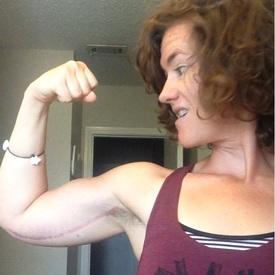We are pleased to announce that as of March 4, 2025, an updated Rich Text Editor has been introduced in the MyFitnessPal Community. To learn more about the changes, please click here. We look forward to sharing this new feature with you!
Quick question about calories

jorda13456
Posts: 62 Member
So say today I ate 1300 calories.
Next day I: Wake up (dont eat breakfast), (dont eat lunch) but throughout the 7 hours I spent riding my bike.
Since biking burns calories, and since I didn't eat anything, does it burn from the previous days calories?
Next day I: Wake up (dont eat breakfast), (dont eat lunch) but throughout the 7 hours I spent riding my bike.
Since biking burns calories, and since I didn't eat anything, does it burn from the previous days calories?
0
Replies
-
Well, your body has fat stores so it burns through those.
But why would you go on a bike ride without eating anything all day? As a cyclist, I don't understand this at all. This wouldn't be a good way to lose weight.0 -
starve yourself and your body will go into starvation mode you'll gain more weight.
why would you do something like this?0 -
berkayaliulker wrote: »starve yourself and your body will go into starvation mode you'll gain more weight.
why would you do something like this?
It wasn't intentional, it just happened this time so I was curious what the results would be since it already has occurred.
Thanks for the info though.0 -
Cortneyrenee04 wrote: »Well, your body has fat stores so it burns through those.
But why would you go on a bike ride without eating anything all day? As a cyclist, I don't understand this at all. This wouldn't be a good way to lose weight.
It could also burn through muscle for fuel, depending on how heavy the person is, etc.
0 -
berkayaliulker wrote: »starve yourself and your body will go into starvation mode you'll gain more weight.
No it won't. If that were true, the soldiers who liberated concentration camps during WW II would have found lots of fat inmates. "Starvation mode" in reality means that the body stops burning calories for things like repairing damaged tissue, growing hair and nails, etc., to preserve fuel for essential functions, so victims' metabolisms drop substantially. But they will still lose weight if eating fewer calories than they need.
OP: In the situation you describe, some of the calories will come from stored glycogen in your muscles and liver, and some will come from fatty acids released from your fat cells. If you bike long enough and/or hard enough, eventually you will deplete the glycogen. At that point you'll experience what we cyclists call a "bonk," because your brain requires glucose to function well, and if you deplete your glycogen and aren't eating carbs to replenish blood glucose, the brain will get messed up until you eat some carbs. That's why we endurance cyclists aim to eat 200-300 calories per hour of easily digestible food on rides that last more than 2 or 3 hours.0 -
Well, each day doesn't exist in a vacuum. Since it happened today, it would come out of today's calories. But then some people look at the whole week's calories rather than daily because of days of high variance like this. Of course, it's not healthy to provide yourself with no fuel before or during an extended workout.0
-
track calories on a weekly basis - you can use your weekly nutrition progress chart to see how many you're under / over for the last week
it doesn't matter if you zigzag - eg eat over / under on a daily basis so long as the general trend is eating less than you use
and a week is a decent time-frame to make sure it's right
so for me I sometimes eat over but if I'm doing it too many times in a week the weekly chart will show me (it works better on my ipad app tbh as I can get a summary that I can't seem to get when logging in to the full site)0 -
Your body will have digested the previous day's food. 1300 cals is lower than most people's BMR, so your body will have used all the food just to sustain itself.
Cycling for 7 hours with no fuel means your body will have to use energy reserves.
This will be: glycogen, fat, lean muscle tissue. This would not be an advisable way to lose weight. Endurance exercise needs fuel.0 -
just, Why?0
-
KarenJanine wrote: »Cycling for 7 hours with no fuel means your body will have to use energy reserves.
This will be: glycogen, fat, lean muscle tissue. This would not be an advisable way to lose weight. Endurance exercise needs fuel.
I thought the OP meant that s/he was cycling part of the 7 hours between waking up, not cycling 7 hours straight. In the latter case, s/he will bonk once glycogen reserves are depleted. Anyone who is planning a 7-hour ride had better already have experience as an endurance cyclist!0
This discussion has been closed.
Categories
- All Categories
- 1.4M Health, Wellness and Goals
- 394.5K Introduce Yourself
- 44K Getting Started
- 260.5K Health and Weight Loss
- 176.1K Food and Nutrition
- 47.5K Recipes
- 232.7K Fitness and Exercise
- 444 Sleep, Mindfulness and Overall Wellness
- 6.5K Goal: Maintaining Weight
- 8.6K Goal: Gaining Weight and Body Building
- 153.1K Motivation and Support
- 8.1K Challenges
- 1.3K Debate Club
- 96.4K Chit-Chat
- 2.5K Fun and Games
- 4.1K MyFitnessPal Information
- 16 News and Announcements
- 1.3K Feature Suggestions and Ideas
- 2.8K MyFitnessPal Tech Support Questions






